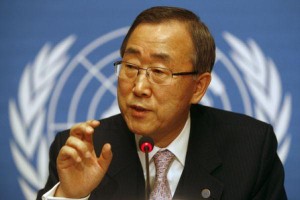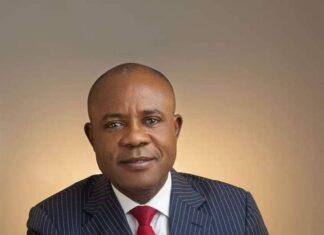Efficient performance of Russia-supplied military hardware to Nigeria’s counter-insurgency operations in the North East rekindles a hitherto dull bilateral relations, setting off increased attention from rival powers, writes Correspondent, SAM NWOKORO.
In any human relationship, careful audit is normal. In the same manner, it is when a nation faces challenges beyond the scope of her ability that it resorts to bilateral or multilateral approaches.
The current counter-insurgency operation, which the Nigerian authorities are executing in the North East part of the country, has tasked the Nigerian authorities so much that it had no option than seek assistance from other countries. This is legitimate, and in her case for very obvious reasons: terrorism is now a global scourge and the manner that is ravaging all parts of the globe is threatening development, as well as United Nations (UN) conventions, protocols and programmes to eradicate poverty in the world by 2030. It is also threatening states affected from prosecuting the Millennium Development Goals (MDGs).
This explains why the UN gave tacit approval to African Union (UN)’s decision to assemble a multinational counter-insurgency force to fight Boko Haram, a religion-inspired murderous fanatical group which has been killing Nigerians since 2009. The AU has already assembled an estimated 7,800 troops to fight terrorism in the continent, while a sub-regional Economic Community of west African States (ECOWAS) force, especially from Chad, Niger and Cameroon, is helping Nigerian forces in her on-going campaigns against Boko Haram in the worst hit states of Yobe, Borno and Adamawa.
Nigeria’s main problem in the fight against Boko Haram had been known to be insufficient military hardware to match the terrorists’ sophisticated weapons, reportedly from diverse global terror networks, including Al-Qaeda and Al Shabaab.
Enter Russia
Nigeria made efforts to exhaust all regional and sub-regional efforts to counter insurgency in the North East before resorting to multilateral assistance. Her first port of call was the ECOWAS and the AU whose are now fighting the insurgents with help with a few global forces. She got the intervention of the office of UN Secretary-General’s office.

But it was more the armoury than the number of personnel that were currently routing the terrorists. Nigeria’s first effort to beef up the armoury of her fighting force was the approval the Jonathan administration got from the National Assembly for a $1 billion re-armament grant. She approached her traditional partner, Washington, to purchase some fighting helicopters to reinforce its armoury because the battalions fighting the insurgency were deserting the frontlines, alleging that the terrorists were outgunning them. Washington reportedly declined to offer those military hardware, alleging the probability that they could be used to commit more human right abuses, since, in their allegations, Nigerian forces had faced trial for unprofessional conduct in the counter-insurgency fight, having been found wanting in November 2013 for alleged brutalisation of some villagers in the course of their efforts.
Washington’s refusal led to Nigeria seeking military assistance from Russia. Local media reported presidency sources as saying: “The botched $15 million arms deal rebuffed by Washington forced Nigeria to look for alternative sources of arms supply.
“The outcome of the strategic move by the presidency is the acquisition of the right kind of armoury that has helped to change the game against the terrorists, with the recent liberation of many towns and communities from the stronghold of the insurgents.”
Some of the weapons from Russia included: T2 tanks deployed to support the troops’ advance to all the areas held by the terrorists in Adamawa, Yobe and Borno which complemented some 70 multiple rocket launchers and Mines Resistant Ambush Protected (MRAP) helicopters; F17 bombers with precision-guided munitions and Alpha jet bombers from France.
The National Security Adviser (NSA), Sambo Dasuki, said: “We also had specialised night helicopter operations that seriously degraded Boko Haram leadership, round-the-clock surveillance by strategic surveillance platforms which provide round-the-clock intelligence to ground troops, during and after operations.”
The official reportedly said the presidency was pleased with Dasuki’s ability to broker the arms deal with Russia principally, South Africa and China.
Diplomatic coup?
Russia’s military aid to Nigeria in the war against terror appears to rekindle a somewhat sleepy bilateral intercourse between both countries at a time it appeared to most Nigerian policy-makers that Washington had goofed.
Dasuki reportedly enthused after Nigeria received new armoury late December: “When Americans refused to assist, and we found out that they were playing games with us, citing human rights violations, several nations were willing to assist us. Israel wanted to assist and still do. Now, China and Russia have been co-operative. This does not mean we have done away with our American and western allies, but our national security comes first.
“Apart from the arsenal and equipment in the inventory of the military which were procured and put into action to combat the insurgents, some specialised and high grade weapons as well as tactics proved to be a game-changer in the effort of the military.”
The Russian army trained about 1,200 Nigerian personnel on counter-insurgency shortly before the latest daring efforts of the Nigerian army, especially some batches of the defence force’s special units, police and intelligence chiefs, after Washington reportedly balked on an earlier agreed military training. The last batch left Nigeria on September 25 last year.
Russian Ambassador to Nigeria, Nikolay Udovichenko, said: “Russia always stands for Nigeria in this struggle (against terrorism). Every year, we provide different trainings and courses in Russia for Nigerian police officers. But, of course, we understand that a lot can and should be done to promote our bilateral collaborations in the security sphere to a higher level.
“In this connection, we are ready to carefully consider any proposal from the Nigerian government, including providing additional training, weapons and ammunition to strengthen our ties in this crucial aspect of our interaction.
“This time, Russia wants to express her solidarity with the federal government and Nigerian people in their fight against terrorism.”
Complaints
Russia’s unhidden enthusiasm in helping counter-terrorism operations in the North East may not be unconnected with her quest to garner much support as much as possible in her war of attrition with the Republic of Ukraine, her rich oil and gas region seeking to break away.
In the past two years, since the agitation by Ukraine to be independent of Russia intensified, the country has been at diplomatic row with Washington, which has been sympathetic to the Ukrainian quest. At times, the United States had threatened diplomatic sanctions against Russia and had undisguisedly supported Ukraine’s manoeuvres to get global endorsement from UN to back her efforts.
It appears Washington has been pressuring her European allies to fully back her sympathy for Ukraine, but has not got the total support. Thus Russia has not relented in seeking to widen her support in the global arena to smother the Ukrainian independence quest.
Shared challenges
Nigeria, like Russia, faces what looks like separatist problems and national security threats. The Boko Haram insurgents have not hidden their agenda to create an Islamic republic out of Nigeria. More than 3,000 lives have been lost and more than that figure displaced by the terrorists. There have been a deluge of internally-displaced persons (IDPs), putting unanticipated strains on Nigeria’s fiscal calculations, with the attendant increase in defence spending.
The Nigerian government, no doubt, feels elated that after more than two years, its army is making headway in disorganising the terrorists since the successful building of a multinational force to aid the Nigerian army in the counter insurgency operations. More towns are being retrieved from the terrorists, and in the past couple of weeks, the casualty figure is at least reducing. The activities of Boko haram has threatened Nigeria’s election, warranting a shift in the polls.
Russia is also facing similar threat from Ukrainian separatist movements, which Washington, for obvious strategic interest, would be glad it does take place, hoping to achieve full approval from UN and her allies which include Nigeria.
Like Kiev, which harbours much of Russia’s oil and gas, a restive part of Nigeria, the Niger Delta, is oil-rich and has been the source of Nigeria’s earnings since Independence in 1960. Like Ukraine, the Niger Delta area has been pushing for resource control and comprehensive amendment of Nigeria’s constitution which currently vests all lands and resources in the hands of the central government.
Jonathan’s government has continued from where his predecessor, the late Umaru Yar’Adua, stopped in appeasing the restive inhabitants of Niger Delta. A new constitution that seeks to enhance the Niger Delta share of mineral resources derivation is yet to be fully adopted by the Nigerian government after a constitutional conference in May last year finished the draft and submitted it to government for incorporation (in the form of amendment to the present constitution). The government’s Amnesty Programme seems not to have adequately addressed the complaints of the oil-producing regions who see government’s effort in that direction as tepid.
Like Russia, the Nigerian government has been slow in using maximum force in dealing with Niger Delta disturbances to avoid provoking more acts of sabotage of oil resources from which almost 80 per cent of her revenue comes from. Russia’s sovereignty is threatened by the seemly resolve of Ukraine to part ways with Russia which was balkanised in the 90s into more than 10 autonomous regions, with Ukraine being the most rich in resources, especially oil and gas – why the West prefer Kiev to go its way.
In fact, Ukraine is known as the cash cow of Russia and since the dismantling of communism and the country’s embrace of market economy, Russia has in the past 10 years bounced back as a power to reckon with once more, supplying most of Europe’s oil needs. Udevincheko’s allusion to the fact that “it is absolutely unacceptable to talk to Russia in the language of ultimatum and coercive measures” is being interpreted in diplomatic circles as subtle but firm message to Nigerian authorities to do away with any thought of joining the international campaign against her policies in Kiev, since Nigeria is facing similar threat to her national security from Boko Haram.
Strengthening ties
In 2009, Russia and Nigeria signed six bilateral agreements to strengthen ties. Those agreements included: investment promotion and protection, agreement on co-operation in the field of peaceful use of nuclear energy, Memorandum of Understanding (MoU) in the field of exploration of outer space for peaceful purpose, agreement on transfer of persons sentenced to jail, and agreement on the use of nuclear energy.
Russia built Nigeria’s Ajaokuta steel mill, among other technologies, most of which are no longer in use in Nigeria today. Nigeria remained non-aligned to neither Russia nor the west in the days of cold war. Then, Africa’s most populous country was a member of the non-aligned movement. But Russia supported Nigeria during the civil war.
There are insinuations in international diplomatic circles that Russia may expect serious support from Nigeria in her campaigns against Ukraine, but that will likely contradict Nigeria’s current posture as member country of the UN committed to the doctrines of Fundamental Human Right, even including the right to freedom of association and of self-determination.
All the approaches that Nigeria will adopt in the face of Russia’s renewed romance is to focus on the economically beneficial side of the bilateral agreements, especially as Nigeria has fully embraced market economy like Russia, while striving to stay out of the fracas between Russia and Kiev.













